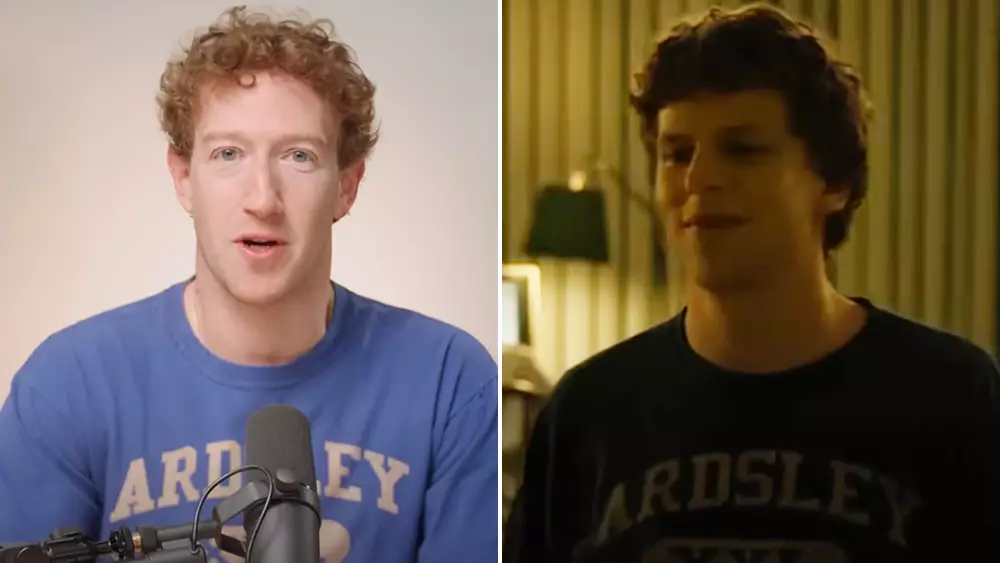In an unforeseen twist of pop culture and technology, Jesse Eisenberg, primarily known for his portrayal of Mark Zuckerberg in “The Social Network,” has found himself unwittingly entwined with the real-life persona of the Facebook founder. In a recent appearance on “The Colin and Samir Show,” Zuckerberg made headlines when he disclosed his successful bid on one of Eisenberg’s iconic shirts from the film. This intriguing revelation speaks to a broader commentary on identity, legacy, and the intersections of fiction and reality in the digital age.
Zuckerberg’s acquisition was not just a casual purchase; it was a nostalgic dive into a representation of his youthful self, as he confirmed that the shirt in question is tied to his own history at Ardsley High School, adding layers of irony to the situation. While Eisenberg has publicly distanced himself from Zuckerberg, claiming he does not want to be associated with the tech mogul’s controversial legacy, Zuckerberg seems to revel in this quirky connection. His light-hearted recollection, “it’s my shirt now,” implies a playful acceptance of his cinematic representation, shedding light on the complex emotions that come with being the subject of both admiration and scrutiny.
The Complexity of Identity in Cinema
Eisenberg’s ambivalence is reflective of a more significant societal concern about the implications of being typecast or chronically connected to one’s roles. Eisenberg’s words on BBC Radio 4 resonate with many actors who fear that their identity might be forever marred by the characters they play. When his portrayal becomes intertwined with Zuckerberg’s real-life endeavors, it challenges both men to navigate a dual narrative—one that blurs the lines between reality and dramatization. This disassociation becomes vital for Eisenberg to maintain his sense of self, especially given the polarizing nature of Zuckerberg’s public image.
Conversely, Zuckerberg’s embrace of this cinematic homage sheds light on his character—perhaps revealing a desire to reclaim his narrative amidst the myriad controversies that have dogged him in recent years. The very act of purchasing the shirt may symbolize ownership over his portrayal and how he wishes to be perceived. It’s a testament to how even the most mundane items can act as powerful symbols in our lives, and in this case, the garment serves as a bridge between divergent paths of fame.
Pop Culture Meets Real-World Relevance
This incident also reflects a broader trend in how pop culture interacts with the tech sphere today. Figures like Zuckerberg often inhabit mythic proportions, with their lives so heavily dissected that events like this auction purchase feel simultaneously trivial and significant. In a world grappling with questions of ethics and influence, such playful interactions remind us that behind the vast corporate empires and controversies, there are human stories and connections—albeit complicated ones.
As the creator economy flourishes, discussions around figures like Zuckerberg will undoubtedly evolve, spawning a new generation of narratives that challenge our perceptions. The irony of Eisenberg’s reluctance to acknowledge his association with Zuckerberg juxtaposed against Zuckerberg’s embrace of his fictional counterpart serves as a microcosm for the way we grapple with identity in a digital landscape. The shirt, once a mere garment, transforms into a symbol of the complex, often contradictory nature of their intertwined identities.


Leave a Reply